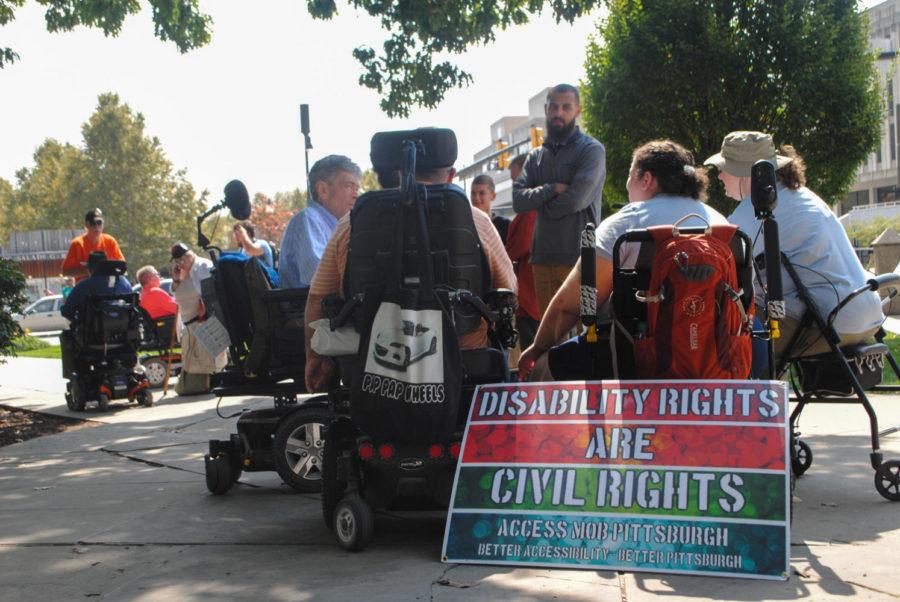Disability advocates crowded the sidewalk on the corner of Bigelow Boulevard and Forbes Avenue Wednesday, Sept. 20, to spread information on three key issues they want to reform.
These three initiatives — distributed to passersby on multi-colored flyers — focused on problems with accessibility in the Oakland and Greater Pittsburgh area, primarily taking issue with aspects of the proposed Bus Rapid Transit.
The BRT project is intended to connect Oakland and Downtown — the two largest job centers in the city — with more frequent and faster buses.
In attendance was Joan Stein, 62, a private Americans with Disabilities Act consultant from Forest Hills and an advocate for people with disabilities — individuals whose needs, Stein said, are often overlooked by community planners.
“They’re not thinking about people with disabilities or seniors in the planning process,” she said.
The BRT project would increase the distance between bus stops — forcing seniors and those with disabilities to travel farther to take public transit — and includes the installment of a protected bike lane which runs along Fifth Avenue, obstructing safe drop-offs for people with disabilities.
One rally organizer, DJ Stemmler, age 56, from Allison Park, said the increased distance between stops is especially detrimental to seniors and people with disabilities, and only gets worse in instances of bad weather.
“Imagine your grandmother using her walker and she has to catch the bus at the corner of her street,” Stemmler said. “Now she has to walk six blocks.”
Stemmler said the addition of a bike lane prioritizes the needs of cyclists over those with disabilities.
“We don’t want our rights to be compromised over a community that is not a protected class,” Stemmler said.
Stemmler, who works at Pitt as a fiscal administrator in the Department of Infectious Disease and Microbiology, also takes issue with the position of the bike lane in front of the Cathedral — which eliminated all curbside parking spots overnight.
“Sometimes it’s the difference between being able to get to a meeting or classes,” Stemmler said. “One night they were just removed — painted over.”
Members of Accessible Pittsburgh quickly alerted the Department of Mobility and Infrastructure, making phone calls and even sending emails to Mayor Bill Peduto.
“There was a lot of pushback,” Stemmler said. “We literally found out they took out the spaces when we got to work the next morning.”
The Department of Mobility and Infrastructure responded by adding back three spots — only one of which is ADA compliant. Only one can accommodate vehicles with a wheelchair lift due to the curve in the road making spots farther down slimmer than the regulation 5 feet.
“We raised hell with them, and they put back a couple,” Stein said.
Aside from the bike lanes and altered bus stops, members of Accessible Pittsburgh are also trying to educate the community on the One Step program, an initiative which requires businesses in Pittsburgh to eliminate steps in their storefront entrance — an obvious barrier to people with disabilities.
Stemmler said this limits food options for people with disabilities, pushing them to eat whatever is accessible — often at fast food restaurants like McDonald’s.
“Could maybe the business being accessible be part of that health impact on disabled people?” Stemmler said.
To solve these problems, members of Accessible Pittsburgh who attended the rally were eager to distribute flyers and promote change by informing community members.
A committee member on the Consumer Health Coalition, Libby Powers, 29, from Sewickley said spreading information about the effects of the BRT project was the main goal of the rally.
“The signatures are great, but voices are greater,” Powers said.
The ultimate goal for the Accessible Pittsburgh group is to be included in the decision-making process before programs are put in place that have detrimental effects to people with disabilities.
“It brings fulfillment, happiness, and a sense of autonomy for people with disabilities to do things that every person can do,” Powers said. “All we want is an invitation to the table.”
Editor’s note: This story has been updated to clarify the status of the BRT project. The project is proposed and currently awaiting funding, it has not yet been implemented.



